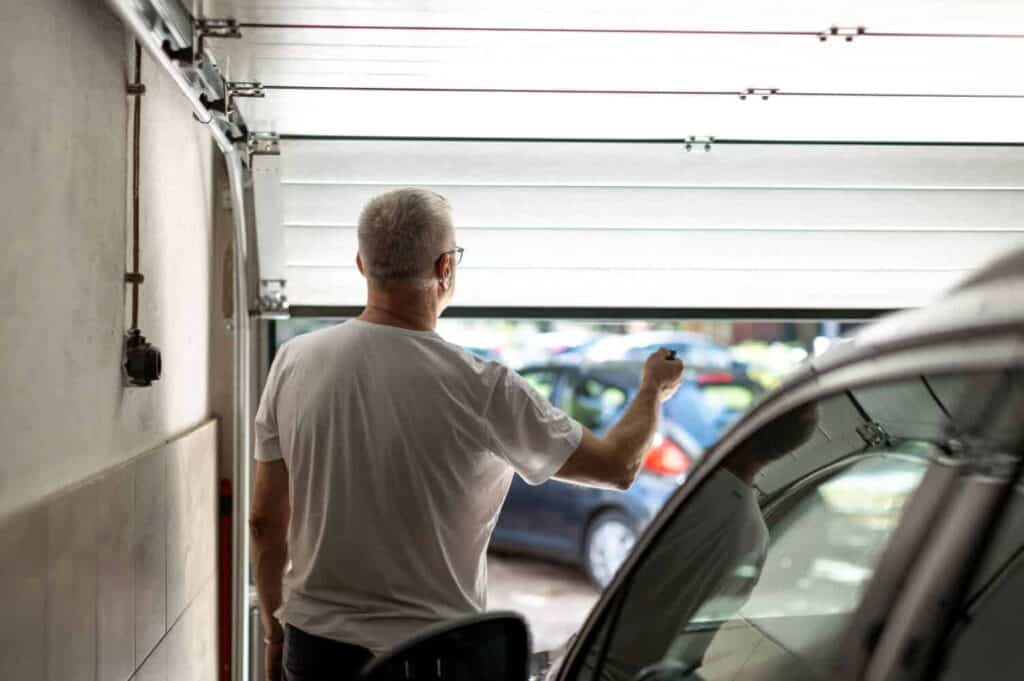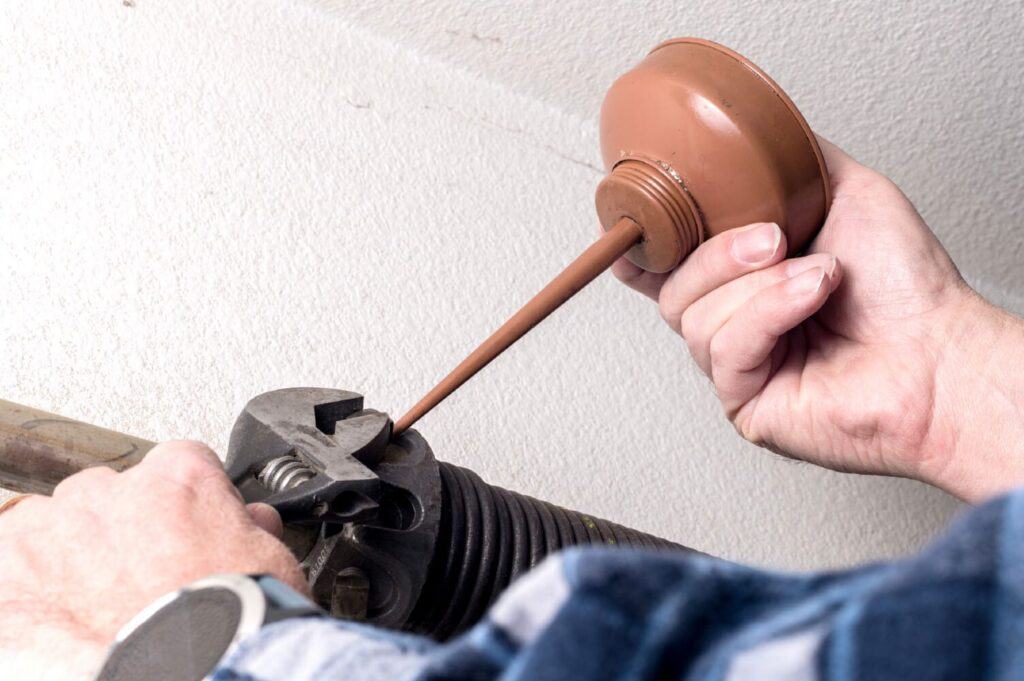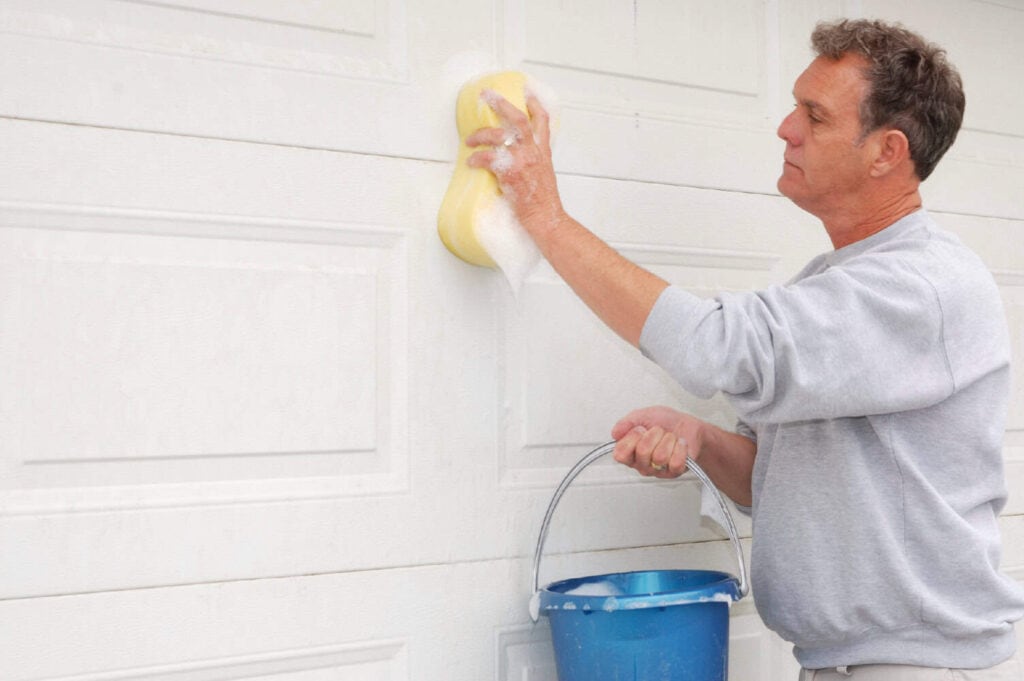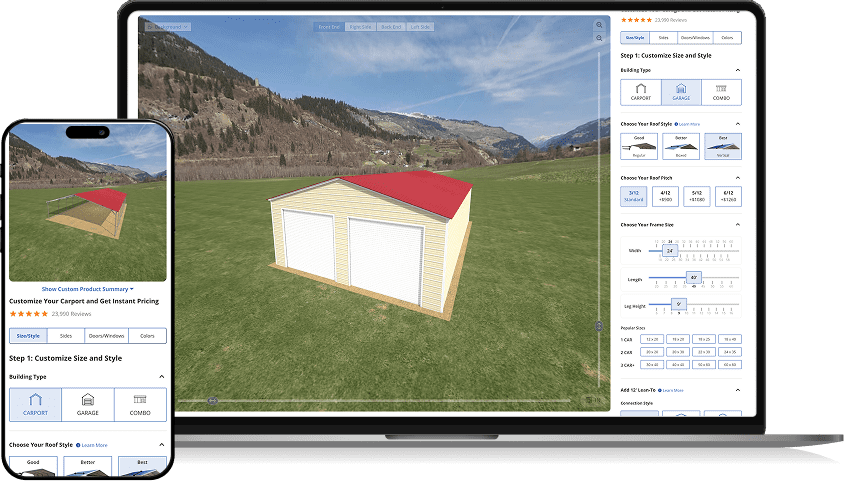Your garage door is an important part of your home, providing security and protecting your car and belongings. But like any well-used machine, it needs regular maintenance to run smoothly and safely. Neglecting your garage door can lead to breakdowns, frustration, and even costly repairs.
Remember safety first: Disconnect the door from the opener before you begin DIY repairs.
The good news is that many maintenance tasks are simple and can be done yourself with just a few tools and some know-how. If you want to tune up your garage this summer, look into these top garage door maintenance tips.
| Tools and materials needed: | |
| Screwdriver Brake cleaner Brush or old toothbrush Cloth or old rag Silicone-based garage door spray | As Needed: Weatherstripping Caulk Silicone wax for door exterior Safety glasses |
1. Monitor the Garage Door’s Movement
First, take a minute or two to stand in your garage and watch it in action. A garage door in excellent condition should:
- Move up and down in a smooth, even way—it should not make unusual noises like grinding or move unevenly.
- Sit evenly on your garage floor when closed—you should not see daylight coming in beneath your garage door.
If the garage door sits unevenly: Replacing the bottom seal on your garage door can correct this problem. The seal also helps keep cold air, leaves, and snow from drifting beneath your door. We’ll talk more about this later in the post.
If your garage door is shaking or jerking as it operates: There may be a problem with its cables, like the springs or pulleys. If you have a garage door with torsion springs, don’t try to adjust them. These are high-tension springs that can cause serious injury. It’s a good idea to call a professional if your door is moving erratically.

2. Check the Hardware
Considering you use your garage door frequently, it goes through a lot of wear and tear—this constant movement could cause nuts and bolts to loosen. If you see signs of this, use a wrench or a screwdriver to tighten them back into place.
Don’t overdo it; overtightening hardware can cause more damage and lead to costly repairs.
Other ways to check your garage door hardware include:
- Observe the rollers on your door to determine if they are worn out. Each roller should be firmly in place with no signs of rust or other damage, like cracks. You can reinstall new rollers as needed.
- Check your cables. These cables connect the tension spring to the garage door. If the cables are fraying, rusting, or breaking, they will need to be replaced to ensure proper movement and safety of the garage door.
| Pro tip: Leave cable replacement and installation to the professionals; the cables are often under high tension and could cause injury if attempted as a DIY project. |

3. Clean the Tracks
Regularly remove dirt, debris, and cobwebs from the tracks to ensure the rollers move as easily as possible. Less buildup means the garage door will open and close more smoothly.
To do this, you can:
- Spray a brake cleaner onto the tracks to loosen up any debris.
- Use a brush or old toothbrush to scrub the debris.
- Wipe up the debris and excess cleaner with a cloth or an old rag.
| Pro tip: If there’s still friction between the door step plate and the door, you may need to adjust the alignment of your track brackets, as they could be crooked. Consider unscrewing them with a screwdriver, realigning them so they are perfectly vertical, and then tightening them back into place. |
4. Lubricate the System
At least once a year, spray a silicone lubricant on the door’s springs, bearings, and hinges. Avoid getting any lubricant on the tracks of your garage door because this can make your door slip and work improperly.
| Pro tip: Do not use general lubricant or WD-40, as it can deteriorate the rollers. Instead, use a silicone-based spray or one made specifically for garage doors. |
Lubricating your garage door properly will help it run smoothly, prevent rust buildup, and prevent extra noise.

5. Do a Safety Test
Garage doors are heavy and powerful and could cause injury or damage to people or objects, so it’s important to identify hazards and test the safety features at least once a year.
There are usually two safety features that come with garage doors: photoelectric sensors and the auto-reverse function.
Testing the photoelectric sensors:
- These sensors are typically located on either side of the garage door opening, near the floor. They use an invisible light beam to detect objects in the doorway. If the beam breaks while closing, the door stops and reverses to prevent accidents.
- To test how they work, find a broom handle or other long object, open the garage door, and wave the object in front of the beam.
- The door should stop closing (and may even reverse slightly)—if not, reach out to a professional to get it checked out.
Testing the auto-reverse function:
- The auto-reverse function reverses the direction of the door if anything is in its path.
- To test, place a 1 ½-to-5-inch-long object (like a 2×4 piece of lumber) flat on the floor in the center of the doorway, where the door would hit it as it closes.
- Initiate closing of the garage door with your remote or wall button.
- The door should automatically reverse direction upon contact with the object.
- If the door makes contact and doesn’t reverse, there could be an issue. Don’t use the door, and contact a garage door professional for service.
| Pro tip: Testing safety features can be risky, so make sure there aren’t any people or animals near the garage door. Always consult a professional when diagnosing and repairing the safety features. |
6. Update the Weather Seal
Check the condition of the weatherstripping around the doors and windows. This weather seal protects the inside of your garage from things like:
- Air drafts: Drafts can be hot or cold, depending on the season. A good seal keeps your garage energy-efficient, keeping conditioned air (or heated air in the winter) inside your garage, reducing the workload on your HVAC system and potentially lowering your energy bill.
- Moisture: A buildup of moisture from rain or humidity can lead to mold or even start to rot the wood of your garage door, affecting items you store in your garage.
- Dust and debris: Prevent the accumulation of dust and debris and save time on cleaning.
- Bugs and spiders: A weather seal can keep bugs and spiders out of your garage, which can potentially cause damage to your belongings or the garage itself.
If the weather seal is cracked or torn away from the wall or the base of the door, it’s a good idea to replace it. Weatherstripping is relatively inexpensive and can be found at any hardware or home improvement store.
| Pro tip: In addition to weatherstripping, consider using caulk to further insulate and waterproof your garage. Add caulk sealant to the perimeter of the door and any windows. |
7. Check the Balance
Once a year, check to see if your garage door is balanced. An unbalanced garage door can:
- Add strain on the opener and make it harder for the cables to lift the door, which could lead to a safety hazard.
- Add tension to the cables, which could risk snapping or breaking.
- Lead to uneven wear of the garage door parts.
If you have an automatic door, close it and disconnect it from the opener by pulling the cord hanging from your garage door rail. Then, pull your door halfway up and slowly let go of the handle. If the door starts to go up or down on its own, it means it is unbalanced. In this case, it’s best to contact a professional to balance your door.
8. Examine and Wash the Door’s Exterior
Taking care of your garage door helps:
- Preserve the door
- Boost curb appeal
- Provide you with a chance to inspect it
Inspection is an especially important maintenance tip if you have a wooden garage, as it is more prone to mold and mildew than metal.
Clean the exterior of your garage door with a gentle detergent and water—avoid harsh chemicals, as they can erode the material of the garage. Use a soft sponge to remove dirt and mud so you don’t put any scratches on the surface of the door. Then, rinse your door with a garden hose. Cleaning the exterior can prevent staining and maintain the appeal of your door.

If you discover any problems, take quick action to keep it from getting worse and save money on repairs down the road.
| Pro tip: For extra protection, especially on steel doors, you can apply a coat of silicone wax after the door is completely dry. This adds a layer of shine and helps repel dust and dirt in the future. |
Maintain Your Garage Door to Avoid Costly Repairs
By incorporating these simple maintenance practices into your garage door maintenance routine, you can ensure it operates safely and efficiently for years to come. A well-maintained garage door not only protects your belongings but also offers peace of mind, avoiding expensive repairs.
If you’re looking to upgrade your garage, you can design and order one using our 3D carport and metal garage builder below—we’ll even deliver and install it for free.




